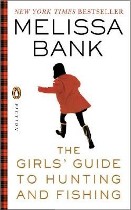 Melissa Bank •
Melissa Bank •
The Girls’ Guide to Hunting and Fishing •
Melissa Bank has one of the freshest young voices in fiction today. I read these stories over and over, marveling at how much meaning she conveys in a few words. On first catching sight of a man she becomes involved with, the narrator observes, “He wasn’t handsome exactly, but his looks carried.” And just like that, you see him.
The first story typifies everything good in this collection. Fourteen-year-old Jane watches the changes in her brother’s behavior when he takes up with an older woman: He’s no longer Henry, but Hank—”whoever Hank was.” At dinner, he eats his corn “like a normal person, instead of typewriter-style; usually, he’d tap the cob at the end of a row and ding.” She both admires and is alienated by the girlfriend, who seems to belong to a different species entirely—one with self-assurance and a worldly outlook. When Henry and Julia break up, he blames the age difference, but Jane thinks, “It sounded to me like better course selection,” the reason Henry gives each time he changes colleges.
Later in the book we see an echo of the poised, confident girlfriend in Jane’s obnoxious boss Mimi (known to her employees as Me-me-me-me). Another familiar element resurfaces in the collection of portable typewriters Jane keeps in her apartment.
The Older Man in Jane’s adult life is an editor, an alcoholic, and irresistible. His thoughtfulness at a time of crisis is powerfully seductive; his mockery of her is unbelievably cruel. Finding out that he has been lying to her about drinking is “like getting the subtitles after the movie.” She may be a romantic, but Jane is also levelheaded enough to jump off the seesaw.
And into the next relationship.








Your email address will not be published.